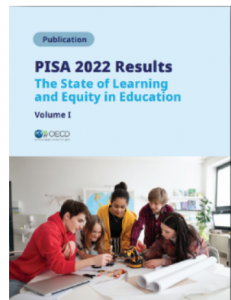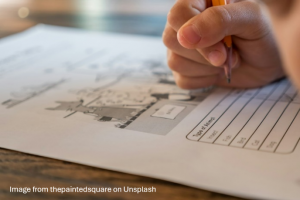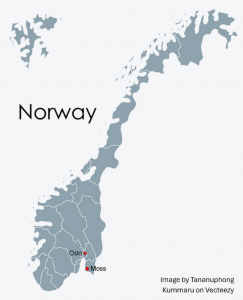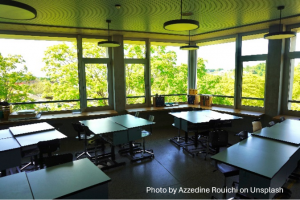
March 25, 2024, by Rupert Knight
Is it possible to abolish primary homework? A view from Norway
In this post, Rachel Lehner-Mear revisits the place of primary homework with an international eye.
I recently came across a report documenting the introduction of a ‘no homework policy’ in one Norwegian municipality. This is not the first time the idea of a homework ban has been discussed in Norway. In 2015, a coalition of politicians on Oslo city council proposed ending homework due to fears it exacerbates inequalities. The councillors instead promised what they called ‘school exercises’ which would provide the practice dimension of homework, but would be completed under teacher guidance in schools.
Calls to rid children’s lives of homework are not unusual. Earlier this year, for example, the President of Ireland told RTE’s children’s news programme that:
… time in the school is an educational experience and it should get finished at the school and people should be able to use their time for other creative things.
The Irish Mirror newspaper followed this up with a poll of its readers, finding that 98%, or 57,440 readers, agreed with the idea of a homework ban. However, examples of where such aspirations have been actioned into a formal ‘no homework policy’ are rare. This makes the story of the Norwegian municipality which has achieved this, particularly striking.
So, this got me thinking: why don’t we abolish homework, given that research highlights its limited academic impact at primary level? In this blog post I reflect on what happened in the Norwegian case, the additional changes needed to make a ‘no homework policy’ work, and what this tells us about whether we could alter primary homework’s dominance in English schools.
The UK homework context
Some years ago, I wrote a post for this blog, reflecting on the fact that although homework is not a statutory requirement and there is no consistent view of what it should be like, it has become a common educational tool in UK primary schools. This can be seen, for example, in Medwell and Wray’s 2019 study of teacher homework practices. I suggested that, since both its purpose and academic value are in doubt, teachers might reconsider what they set for homework to ensure it is at least an enjoyable activity.
Several years on, homework’s position in the UK education system remains entrenched. Its framing as a fundamental activity, the expectations of both parents and teachers, and an accountability system which encourages school-to-school competition, all position homework as an undeniable, ubiquitous practice. Yet in 2017, an Ofsted Parents Panel report suggested that more than a third of parents (36%) believe primary homework is unhelpful, with parents of pupils with SEND finding it particularly problematic.
Homework’s proponents often point to Programme for International Student Assessment reports in which pupils from homework-heavy education systems in Singapore and the Chinese provinces consistently outperform those from other nations (for latest PISA results see here). But the homework-PISA results association can be readily critiqued, since Finland and South Korea, which set no homework for primary children, also regularly appear near the top of the PISA league tables. Equally, Indonesia, a culture in which additional home learning is considered highly desirable, features amongst the lowest performing countries. Moreover, a multitude of research studies and meta-analyses cast doubt on homework’s effectiveness – at best, primary homework might have marginal benefits. (A 2014 interview with the researcher John Hattie provides an overview of some of the research).

I won’t rehearse these debates further here. Instead, recognising the contention around homework, I play devil’s advocate and propose that perhaps it’s time we simply abolished homework altogether …
Are we ready to change how we use homework?
Although homework prevails in the UK context, it is not unusual to hear both teachers and academics bemoan its use, distrusting its value and pointing out its inherent problems. Common charges against homework include that it reproduces inequalities, since not all families are equally equipped to support children’s home learning (highlighted by some families’ low engagement with homeschooling during the Covid pandemic). Or, that homework’s benefits are outweighed by the tensions caused in the parent-child relationship. Or, that homework has a negative impact on family time, hobbies, and social interaction. Furthermore, for teachers themselves, homework is often experienced as yet another burden amongst myriad pressures on their time. Many educators also question homework’s academic benefits. The Confident Teacher, a teacher-turned-educational writer, has blogged about why he thinks homework doesn’t work, which sums up several of these teacher complaints. Even the Education Endowment Foundation (EEF) toolkit, intended to guide schools’ decision-making, advocates its adoption for being ‘low cost’ rather than for robust evidence of its effectiveness. Frankly, if homework doesn’t offer substantial long-term gains, teachers can be forgiven for questioning whether it is worthwhile.
Teacher-to-teacher conversations like these hint that there might be an appetite for changing, or even abolishing homework. Given that government guidance regarding primary homework was withdrawn in 2012 (making Head Teachers the homework decisionmakers) and the current Ofsted Inspection Handbook no longer promotes it, the door appears open for radical change. So, could we just abolish homework?
What can we learn from past calls to go ‘no homework’?
With this question in mind, I consider the cases of Italy and Norway, to gain insight from their attempts to eliminate homework.
In Italy, despite schools having autonomy for homework policy, it frequently enters the national debate, with politicians regularly advocating homework abolition. In December 2018, for example, Il Giornale newspaper reported the Education Minister’s demand for less holiday homework, to ensure families would have a happy Christmas. Added to these political calls, this 2015 study by Kremer-Sadlik and Fatigante found there is parent-teacher tension in Italy over homework: teachers view parental homework involvement as problematic; parents perceive teachers as unwilling to illuminate homework’s purpose. Yet despite teachers and parents finding homework difficult, and the political elite pursuing systemic change, homework remains embedded in Italian schooling. The Italian case suggests a discourse of change, or general dissatisfaction from either teachers or policymakers, is insufficient to shift the dial on homework.

In any case, UK politicians tend to take a different stance. In 2018, the actor Rob Delaney gained substantial media traction following this tweet:
Why do they give 7 year olds so much homework in the UK & how do I stop this. I want my kid frolicking & drawing & playing football. Who knows more about stopping this madness & can help me?
Whilst a twitter storm ensued, with high-profile personalities weighing in (Piers Morgan in favour of homework; Gary Lineker, against), the then Education Minister’s reaction was to put a statement on the gov.uk website reiterating support for the practice: ‘Homework is a staple of school life, and of home life,’ he wrote. In the UK then, political impetus for homework’s use prevails, despite publicly-aired counterarguments, a lack of supporting legislation, and possible teacher dissatisfaction.
What does a ‘no homework policy’ look like? The case of Moss, in Norway
This brings me to the published report I mentioned at the start of this piece, which describes how a Norwegian municipality has recently introduced a ‘no homework policy’.
In 2022, Kjersti Holte, a homework researcher, was invited to conduct an Action Research study in the Norwegian municipality of Moss, where local politicians had announced a policy to phase homework entirely from all 16 local schools by 2025 (later amended to an immediate ban). Holte’s focus was how to support school leaders in implementing the policy change, rather than on how the new policy would work. Nevertheless, her report provides a case study from which we might learn whether it is possible to realise fundamental change to established homework practices, and if it is, what needs to be considered to achieve this.

The Moss project defined eight ‘no homework principles’, paraphrased here:-
-
No homework to be assigned for after school hours.
-
School to hold primary responsibility for student achievement, with parental responsibility absolved.
-
If a problem exists with student progress or motivation, adjustments to be made within school.
-
Parents to support their child’s learning in other ways e.g. ensuring sufficient sleep, good nutrition, participation in extra-curricular activities etc…
-
Teachers to value both the student’s role in the family, home, and local community, and their participation in leisure activities.
-
Student knowledge and skills to be reviewed by teachers.
-
Teachers to give in-school opportunity to prepare for assessments.
-
Parents to be kept informed of their child’s academic and social development.
A review of these principles suggests important shifts in the way three key dimensions are being understood: ‘childhood’, ‘the parental role’ and ‘education’. Principles 1, 4 and 5 for example, afford children entitlement to leisure activities, and indicate a respect for their out-of-school life. This projects a particular view of ‘childhood’, with homelife both separated from, and given equal weighting to, school life.
Similarly, principles 2, 3, 4 and 8 make particular assumptions about ‘the parental role’ in children’s development, according parents responsibility for physical and mental wellbeing and rejecting their accountability for educational achievement. Indeed, parents are given a right to knowledge about their child’s progress, rather than a responsibility for it. This parental positioning contrasts the educational responsibilisation discourse prevalent in the UK, on which primary homework practices currently rest.
Finally, the principles situate ‘education’ firmly within schools, reinforcing sole teacher responsibility for academic progress (principles 2, 3, 6, 7). Thus, this no homework policy not only assumes a reframing of the teacher-parent, school-home relationship, but is also underpinned by a particular view of education – what it is, where it occurs and who is accountable for it.
What else is needed to go ‘no homework’?
As Holte and colleagues worked with school leaders to support the move to homework abolition, they discovered that the political ‘top down’ decision-making which introduced the new policy, caused difficulties. Some school leaders resisted the change, for example, while teacher unions objected because the policy originated with politicians and not educators. Holte’s report alerts us that buy-in from Head Teachers and teachers is essential for homework practices to change.
Whilst this positions school leaders as critical, the Norwegian experience also suggests it would be difficult for individual schools to ‘go it alone’. Comments recounted to Holte reveal that even when Heads were sceptical about the policy, they were willing to adopt it because all other schools in the area were also making the change. This speaks to homework’s assumed role in demonstrating ‘school quality’. To abolish an activity perceived by local communities as an indicator of a ‘good’ school is risky for a lone Head. Therefore, systems level change seems necessary to overhaul processes which have become universal. Both leadership support and widescale systemic change are necessary to alter a practice like homework which is deeply embedded in contemporary educational culture.

The Moss project also highlights the complementary measures required for schools to feel confident in dropping homework, some of which are connected to what happens in other parts of the teaching-learning system. Leaders spoke about the need to ensure the quality of in-school teaching, hinting that this demanded significant confidence in their staff. They also noted the need for teacher-parent relationships to realign, and spoke of their anxiety about what was considered a significant policy change. In other words, according to Head Teachers in Moss, abolishing homework is the ‘easy’ part. What happens next is more challenging.
The minor problem, in this case is to stop giving assignments. According to the leaders, the most significant challenges are ensuring high-quality teaching, finding new ways to engage parents, and engaging all the teachers in developing [their] practices. (Holte, 2023, p.16)
Indeed, what the Norwegian experiment reveals is not that homework cannot be eliminated, but that in abolishing such a well-established practice, other adaptations might simultaneously be required.
Furthermore, Holte’s report highlights that, ‘while the evidence of the problems with homework is clear, more evidence is needed on the effects of the no-homework policy for many [teachers and Heads] to be convinced’ (p.17).
Unfortunately, this conclusion produces a classic chicken-and-egg scenario. Whilst educators, talking in staffrooms, may be cognisant of problems with primary homework and its likely ineffectiveness, their confidence to ‘abolish’ it might only be secured by, first, explicitly demonstrating the success of operating without homework – a story which, ironically, can only be told once homework has been eliminated.
This makes future educational outcomes in places like Moss of critical importance. If pupils’ achievements in Moss hold up over the next few years, this might offer reassurance to teachers elsewhere that fundamental change to homework is possible – including, perhaps, its complete abolition.
What next in English schools?
The Norwegian case reviewed here suggests that moving away from homework, to any substantial degree, is complicated. To do so successfully, probably requires careful consideration of a number of interconnecting factors. For teachers who want to think about adapting homework, the following questions are intended to support internal school conversations about how this might be achieved. These prompts can be used to reflect broadly about how homework fits into the English education system, or applied at a more micro level to think about its use in an individual educational setting:
-
What principles underpin the way homework is currently used? What underlying principles could be used to create a different kind of homework policy or practice?
-
What small adaptations could be made to other connected practices which would support a reduction in homework?
-
What role do / should parents play in their child’s education? How else might parental engagement be encouraged, other than through homework?
-
What do parents and the wider local community think about homework? What does this mean for practice? How could changes be communicated to parents?
-
What existing indicators of school strength are there which do not rely on homework as a supporting practice? Do these indicators offer confidence that homework could be reduced or changed?
-
How might local schools discuss or share a common homework approach?
References
Holte, K. (2023). Supporting School-leaders in Leadership for Social Justice Using a No-homework Policy After a Top-down Decision. Journal of Leadership in Education 54, report no. 1/2023. Institute of Education for the Republic of Slovenia. https://doi.org/10.59132/vviz/2023/54/4-21
Kremer-Sadlik, T., & Fatigante, M. (2015). Investing in Children’s Future: Cross-cultural perspectives and ideologies on parental involvement in education. Childhood, 22(1), 67-84. https://doi.org/10.1177/0907568213513307
Medwell, J., & Wray, D. (2019). Primary Homework in England: The beliefs and practices of teachers in primary schools. Education 3-13, 47(2), 191-204. https://doi.org/10.1080/03004279.2017.1421999
No comments yet, fill out a comment to be the first

Leave a Reply